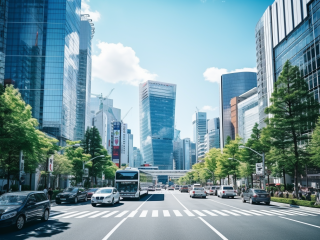Advantages of Japan life

1. Elegant environment
Japan is a world of maple leaves and cherry blossoms, with picturesque scenery throughout the year. There are many food commercial districts and various public transportation facilities that span across Japan, ensuring safe and convenient travel for citizens.
2. Universal healthcare insurance
Japan’s healthcare insurance system is considered one of the relatively perfect systems in the world. It covers almost all residents, including Japanese nationals, permanent residents, and foreign residents. Insured individuals need to pay a certain percentage of medical expenses, usually 20% to 30%. The government covers the remaining costs. Under Japan’s universal healthcare insurance system, you can receive higher quality medical coverage at lower costs.
3. High income for Japanese
According to data released by the Japanese government as of 2020, the average annual salary in Japan is approximately 4.3 million yen (about 1.06 million Thai baht). The average annual salary in Japan is about 11 times higher than Thailand’s average salary. In Tokyo and its surrounding areas such as Nagoya and Osaka, the average salary is usually around 5.5 million yen (about 1.34 million Thai baht).
4.Well-established welfare pension system in Japan
A national system designed to provide a certain basic standard of living in situations such as old age, disability, and death.
There are three main types of pensions in Japan: National Pension (basic pension), Employees’ Pension Insurance (healthcare pension), and Welfare Pension from specific sectors or organizations.
National Pension (basic pension): Applicable to all individuals residing in Japan between the ages of 20 and 60 years old who do not have wage income but are self-employed or freelancers etc.. Typically receives over ¥100k per month (approximately THB24k).
Employees’ Pension Insurance: Applicable to employees working for companies or those with wage income, in addition to the basic pension. A portion of the monthly salary is deducted as accumulated retirement funds. Typically, men receive ¥200k-¥250k per month (approximately THB49k-THB60k), slightly lower for women.
Welfare Pension: Retirement insurance system for specific industries or organizations, including agriculture, fisheries, and medical professionals.
5. Developed technology industry with modern equipment
Japan is a country with a developed technology industry and its education system enjoys a high reputation worldwide. Japan has produced 28 Nobel laureates so far, making it the Asian country with the most Nobel Prize recipients. Japan invests significant amounts of money and resources into cultural and technological education for its citizens. Elementary to high school education is free and compulsory, while universities have top-tier faculty members and well-equipped classrooms, libraries, and laboratories. Students are also nurtured in their social responsibility awareness as well as autonomous learning abilities and creativity.
6. Safety in Japan
Japan has a very low crime rate. On one hand, moral education and character development are emphasized from the first grade of primary school to cultivate students’ respect for laws and rules. On the other hand, Japan has a vast social welfare support system that includes unemployment insurance, welfare programs,and housing assistance which helps reduce social dissatisfaction and motivation for crime.

